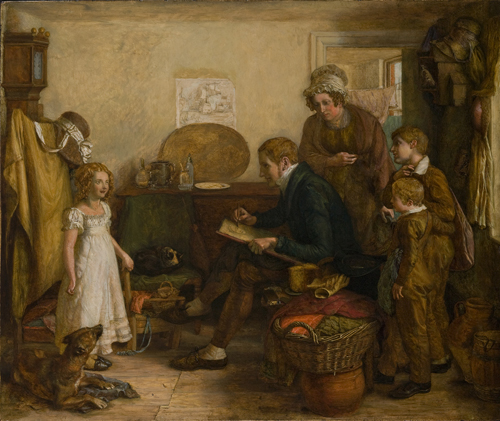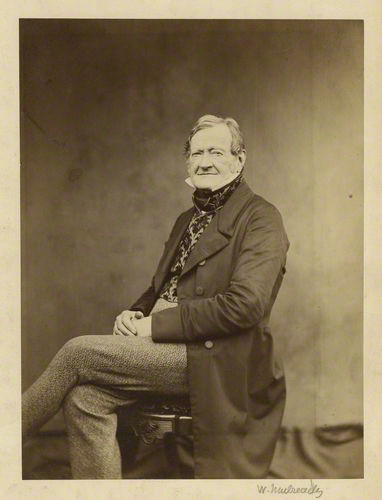William Mulready was born in Ennis in Ireland on April 1st 1786. His family moved to Dublin shortly after he was born and when he six to London where he was to live for the rest of his life. His father was a leather breeches maker and the family lived in Compton Street in Soho. His aristic talent was noticed at an early age by the painter John Varley and sculptor Thomas Banks. At the age of 14 he was admitted to the Royal Academy School where he became the pupil of William John Varley. The close relationship between master and pupil was cemented when Mulready fell in love with and then married Varley’s sister Elizabeth in 1802, she was 18 at the time but Mulready was even younger, a mere lad of 16. The couple had four children, four sons, in rapid succession between 1805 and 1807 and then the marriage fell spectacularly apart. The couple separated, Mulready making vague accusations of ‘bad conduct’ but never providing any details and Elizabeth insinuating that he was completely to blame for the failure of the marriage because his cruelty, his pederasty and his adultery.
After the failure of his marriage Mulready began a long term relationship with a married woman called Elizabeth Leckie. Not much is known about either Mrs Leckie or Mulready’s relationship with her mainly because he was understandably secretive about the “irregularities of his private life”. Mrs Leckie’s husband James seems to have disappeared from the scene very early on, shortly after the birth of a daughter Mary who eventually took the name Mary Mulready Leckie. Mrs Leckie kept a lodging house in Kensington and Mulready seems to have been a frequent visitor. Mulready’s unusual family set up may have been the subject of his picture “The Child Sitter” which shows an artist drawing a young girl watched by two young boys and what appears to be the girls mother. A writer for Art dealers Ncolas Bagshawe identifies the artist in the picture as Mulready himself, the young girl as Mary Leckie, the two boys as two of Mulready’s sons by Elizabeth Varley, the lady in the cap as Mrs Leckie and the probable location of the scene as Leckies lodging house.
nicholasbagshawe.com/view-artwork.asp?id=73
After the failure of his marriage Mulready began a long term relationship with a married woman called Elizabeth Leckie. Not much is known about either Mrs Leckie or Mulready’s relationship with her mainly because he was understandably secretive about the “irregularities of his private life”. Mrs Leckie’s husband James seems to have disappeared from the scene very early on, shortly after the birth of a daughter Mary who eventually took the name Mary Mulready Leckie. Mrs Leckie kept a lodging house in Kensington and Mulready seems to have been a frequent visitor. Mulready’s unusual family set up may have been the subject of his picture “The Child Sitter” which shows an artist drawing a young girl watched by two young boys and what appears to be the girls mother. A writer for Art dealers Ncolas Bagshawe identifies the artist in the picture as Mulready himself, the young girl as Mary Leckie, the two boys as two of Mulready’s sons by Elizabeth Varley, the lady in the cap as Mrs Leckie and the probable location of the scene as Leckies lodging house.
nicholasbagshawe.com/view-artwork.asp?id=73
Mulready’s "six-poster Lombard Renaissance" monument is made of artificial stone and was designed by Godfrey Sykes who was one of the artists responsible for the decoration of the Victoria and Albert museum. The monument, which features prominently on the Central Avenue of Kensal Green Cemetery, was exhibited at the 1867 Paris Exposition Universelle, where it won a prize. Mulrerady reclines, in life size effigy, on plush upholstery protected from the elements by a canopy. The base of the monument has incised representations of some of Mulready’s better known paintings as well as palettes and paint brushes and other symbols of the life of an artist.




No comments:
Post a Comment